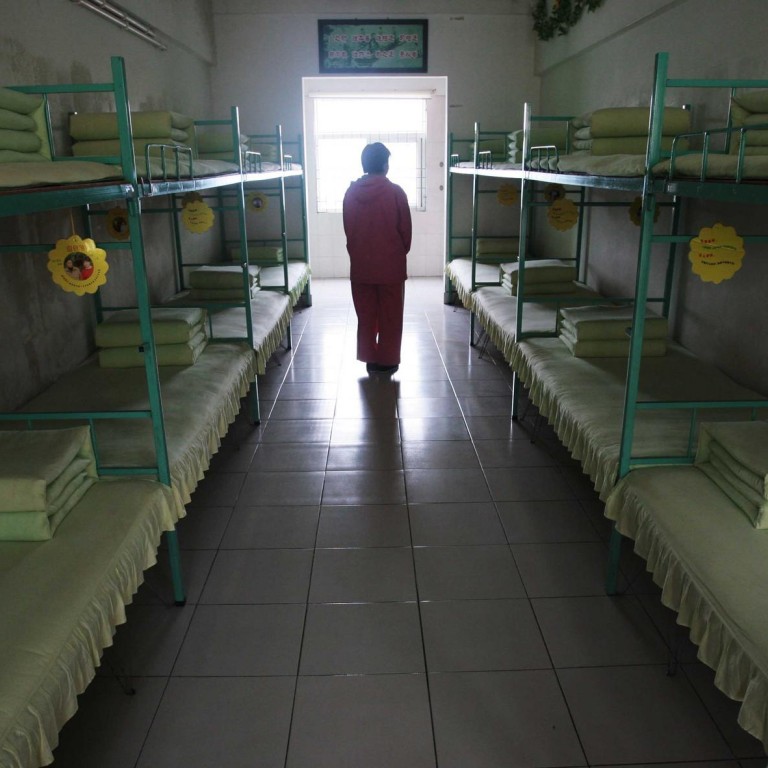
No love lost for 're-education through labour' system
'Re-education through labour' has long been seen as abusive by rights groups, but system instituted in 1950s had plenty of staying power
Although the mainland's "re-education through labour" system has long been criticised by scholars and rights groups, it was not until last year that hope for change appeared to be in sight.

The administrative system gives police the power to send people accused of relatively minor offences - from prostitution to participating in religious cults or criticising the government - to labour camps for up to four years, without trial.
Tang Hui was given 18 months of hard labour in August for campaigning for harsher punishment for the seven people who abducted, raped and forced her 11-year-old daughter into prostitution in Hunan province.
Tang's punishment for "disturbing social order and exerting a negative impact on society" drew a huge public outcry. She was released within days.
An open letter from 10 lawyers urging the government to reform the hard-labour system was subsequently published on the website of the - a highly unusual move that signalled some official support for change.
Then, the case of Ren Jianyu , a 25-year-old village cadre who got into trouble for posting a photograph of himself wearing a T-shirt that said "Give me liberty or give me death", was given wide coverage by state media.
Ren served 15 months in a Chongqing labour camp for reposting "subversive" microblog comments criticising the policies of the now disgraced leader of the municipality, Bo Xilai .
For decades, millions more like Ren and Tang were forced into labour camps. The re-education-through-labour system - called - was introduced by the communist regime in 1955 to purge "counter-revolutionaries" and "class enemies".
Later, it was used as a tool to purge "rightists" - mostly government critics accused of "subversive thinking". More recently, it has been widely used to lock up petitioners who try to bring local grievances to the central government's attention.
Based on state media reports, the New York-based group Human Rights in China had earlier estimated that about 100,000 were forced into labour camps annually from 1983-91. The group believes the numbers have since grown.
A 2009 United Nations Human Rights Council report estimated that around 190,000 inmates were locked up in 320 re-education-through-labour centres across the country.
Human Rights in China said reports from political detainees, among others, suggested that conditions at these centres were generally abusive, with overcrowded, unsanitary living conditions, inadequate food, endemic violence and inmates subjected to excessive work hours.
China Human Rights Defenders, who had also interviewed former detainees, said in a 2009 report that detainees were often forced to engage in heavy manual labour in hazardous environments, with minimal or no pay.
It said the conditions in the camps tended to be "extremely poor", and detainees were frequently tortured, given bad food and extorted for money.
Legal scholars and rights group have long complained that the individuals sent into the system were often deprived of their freedom without charge, trial, access to counsel or right to appeal.
China Human Rights Defenders said was also a convenient tool for police to lock up individuals found innocent by a court, making the system "a hotbed of injustice".
After state media reporting of abuses, the government last year announced that four cities - Jinan , Lanzhou , Nanjing and Zhengzhou - would take part in a pilot programme experimenting with other ways to "re-educate" those accused of minor offences.
In October, Jiang Wei, head of a government committee in charge of judicial reform, admitted that some regulations and procedures in the labour-camp system were flawed, and said that a reform plan was being drafted.
But even so, people continued to be given the penalty. At least four Shanghai petitioners were ordered to serve re-education through labour for "disturbing social order" ahead of the 18th national party congress in November.
While welcoming the reform drive yesterday, rights groups still fear that without an outright abolition of the system, existing abuses may continue unabated under a new scheme of administrative detention.

